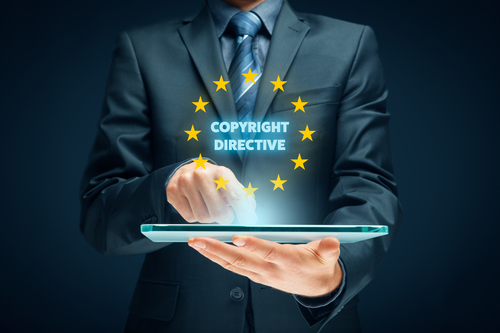 A little while back I wrote a summary of where the debate had got to in Europe on the question of new obligations for online platforms and other internet intermediaries regarding the availability of unlawful content online. This article gives an update, following a highly publicized vote in the European Parliament in September 2018 concerning EU copyright reform.
A little while back I wrote a summary of where the debate had got to in Europe on the question of new obligations for online platforms and other internet intermediaries regarding the availability of unlawful content online. This article gives an update, following a highly publicized vote in the European Parliament in September 2018 concerning EU copyright reform.
Some scene-setting
It is worth giving a brief recap of the current regime in Europe. Articles 12-14 of the E-commerce Directive (ECD) contain protection from liability for those acting as “mere conduits”, and those who are caching, or performing hosting services. The most relevant for the present debate is the Article 14 hosting defense. This shields information society service providers (such as ISPs, platforms, social media, etc) from liability for content stored at the request of a user of the service as long as they do not have actual knowledge of the illegal activity or information and are not aware of facts and circumstances from which the illegal activity or information is apparent. If the provider obtains such knowledge or awareness they are still protected as long as they act “expeditiously” to remove or disable access to the information (notice and takedown).
This goes hand in hand with Article 15 ECD, which prohibits general obligations being imposed on providers to monitor the information transmitted, stored, or actively to seek facts or circumstances indicating illegal activity.
The hosting defense covers not just technical storage providers, but can also apply to sophisticated platforms doing more than mere storage.
Is Europe moving away from the current regime?
There are two aspects to look at: case law, and current EU legislative proposals and policy documents.
Case law
In my last piece I referred to two European Court of Human Rights cases, Delfi and MTE and Index.hu v Hungary, in which portals had been found liable in respect of reader comments posted to articles. I pointed out that the correctness of the (questionable) Estonian and Hungarian domestic rulings that no intermediary protection applied to the portals was not under review by the supranational ECtHR, and so they were not necessarily indicative of a wider continental trend towards eroding intermediary protection.
I also referred to two judgments issued by the Northern Ireland High Court (CG v Facebook Ireland Ltd and J20 v Facebook Ireland Ltd), various aspects of which were subsequently overturned by the Court of Appeal in both cases. The NICA’s findings on appeal somewhat reduced some of the concerns platforms would have been feeling based on the first instance findings, at least as regards the question of when “actual knowledge” accrues to a platform.
A question which remains unanswered is the extent to which platforms can be ordered to prevent the reappearance of content previously removed. Since the last piece, there has been a new reference to the Court of Justice of the European Union (CJEU) by the Austrian Supreme Court, on this question of ‘notice and stay down’ (Glawischnig-Piesczek Case C-18/18). In that case, an Austrian politician obtained an order obliging Facebook not only to remove certain defamatory content but also to delete any future material bearing comments that were identical to the original wording, or if the comments were similar in meaning and Facebook had actual knowledge of these comments. On appeal, the Supreme Court pointed out that a broad injunction including statements differing from the original could conflict with the prohibition against imposing a general monitoring obligation on intermediaries (Art. 15 ECD).
The Supreme Court has therefore asked the CJEU whether Article 15 ECD precludes an order requiring a hosting provider found to have failed to expeditiously remove illegal information not only to remove the specific information but also other information that is not identical in wording but similar in meaning; and whether that differs once the host provider has actual knowledge of the information. Intermediaries will be watching for the next development in this case for two reasons. First, because of the potential impact on the permissible width of injunctions that could be ordered against them in terms of the nature of the content which is the subject matter of the order. But also second, because the Court has, in addition, referred questions about the permissible territorial scope of such an order (in the case at hand, should it be global or limited to Austria).
Most recently, on August 8th 2018, the CJEU issued a ruling in the SNB-React case (C-521/17). The case concerned the liability of providers of IP address rental and registration service, but the Court made more general comments about the application of the protections from liability in the ECD. The Court recapped that the limitations of liability for mere conduit, caching and hosting services can only apply where the activity is of a mere technical, automatic and passive nature, which implies that that service provider has neither knowledge of nor control over the information which is transmitted or stored. So far, nothing new.
In the Google France and L’Oreal v eBay cases, the Court ruled that playing an active role of such a kind as to give a service provider knowledge of, or control over the content in question would take a service provider outside the limitation of liability. However, some commentators have drawn attention to the wording in the SNB-React judgment which is arguably not consistent with these earlier judgments. In particular, the CJEU rather inaccurately paraphrased the ‘active role’ from L’Oreal as “allowing” users to optimize online sales activity, rather than “providing assistance” as it was put in L’Oreal. Further, the ambiguous nature of some of the CJEU’s wording in its answer to the second question referred has led some to question if the CJEU was deliberately decoupling ‘knowledge /control’ from ‘active role’ (albeit, the CJEU was still requiring both before the exemption from liability would be disapplied). Given this would be a departure from previous rulings, and that the CJEU chose not to have the benefit of an Advocate General’s Opinion in this case, it is perhaps more likely to be merely the result of some loose language.
Proposed Copyright Directive
By way of brief recap, in September 2016 the Commission published draft text for a proposed new Copyright Directive. Draft Article 13 would oblige service providers that store and provide access to large amounts of works uploaded by users to: (1) take measures to ensure the functioning of agreements concluded with rights holders for the use of their works, and (2) prevent the availability on their services of works identified by rights holders through cooperation with the service providers. An example given of such measures is effective content recognition technology.
Both sides of the debate (rights holder vs intermediary) continue to be vociferous in their commentary. Many observers have also pointed out the lack of clarity around how this regime (specifically, part (2) above) is supposed to fit with the prohibition on monitoring in Art. 15 ECD, and other EU legal instruments.
What’s the state of play right now?
The European Parliament held a vote on September 12th 2018 regarding the next steps for the proposed Directive. The Parliament voted in favor of providing a mandate for three-way (“trilogue”) negotiations to begin on the draft Directive, on the basis of an amended version of the text originally proposed by the Commission.
The Parliament endorsed a version of Article 13, applying to ‘online content sharing service providers’, defined as those who store and give access to significant amount of copyright protected works or other protected subject-matter uploaded by its users, which the service optimizes and promotes for profit-making purposes. The measure provides that such OCSSPs do perform an act of communication to the public (which is a question currently before the CJEU in two cases referred by the German supreme court), and so need a license from right holders covering UGC. If they don’t take a license, they must cooperate in good faith with right holders to prevent the availability of protected works on their services. Unlike the original proposal, this version contains no longer any express reference to the use of content recognition technologies.
Three-way negotiations between the Commission, Parliament, and Council began in October 2018 to find final agreement on the legislative proposal. While the Commission has expressed a wish to complete this process by the end of 2018, it is likely to take considerably longer to iron out the differences in the positions of the co-legislators. The new elements added by the Parliament will have to be discussed fully over the coming months. However, the EU institutions will be very conscious that the European Parliament elections are looming in May 2019, so negotiators will be under intense pressure to reach a political agreement before the Parliament’s term ends on April 18th 2019.
Commission Recommendation on Measures to Effectively Tackle Illegal Content Online
The publication on September 28th 2017 by the Commission of a Communication about tackling illegal content online generated plenty of controversy. The thrust of the Communication was apparent from its sub-title: “Towards an enhanced responsibility of online platforms“. The Communication laid down a set of guidelines and principles for online platforms to “step up the fight against illegal content online”. From an intermediary perspective, there were concerns over, for example, over-reliance on so-called trusted flaggers; whether sufficient heed was being paid either to variation between laws of different EU countries about what content is illegal or to context; and proactive measures by online platforms (including automated filtering technology) in the context of the Article 15 prohibition on general monitoring duties.
The Communication provided guidance and recognized it did not change the legal framework or contain legally binding rules. However, it was described as a first step.
In March 2018, the second step was taken, when the Commission issued a Recommendation on Measures to Effectively Tackle Illegal Content Online. This largely followed the Communication, apart from certain additional provisions regarding terrorist content (where stronger measures apply). This includes assessment and, where appropriate, removal within one hour of receiving notification from competent national authorities or Europol.
The Communication set up the possibility of legislative action in this area. Consistent with this, the intention is to monitor the Recommendation within three months as regards terrorist content and after six months as regards other illegal content. On September 12th the Commission announced a proposed new Regulation regarding the rapid removal of online terrorist content (but not at this stage other forms of unlawful content).
Conclusion
This time last year, the combination of the Commission’s September 2017 Communication and the proposed Article 13 of the draft Copyright Directive led some to conclude that Europe was indeed moving away from protecting internet intermediaries. The Communication has now been backed up by the March 2018 Commission Recommendation and proposed new Regulation (with its focus on terrorist content). Whether Article 13 is ever enacted and in what form is still to be decided, but it is closer to adoption now than before the vote in September 2018. Meanwhile, we await answers from the CJEU regarding the permissible subject-matter breadth and territorial width of injunctions made against intermediaries.
Image Source: Deposit Photos

![[IPWatchdog Logo]](https://ipwatchdog.com/wp-content/themes/IPWatchdog%20-%202023/assets/images/temp/logo-small@2x.png)

![[Advertisement]](https://ipwatchdog.com/wp-content/uploads/2024/04/Patent-Litigation-Masters-2024-sidebar-early-bird-ends-Apr-21-last-chance-700x500-1.jpg)

![[Advertisement]](https://ipwatchdog.com/wp-content/uploads/2021/12/WEBINAR-336-x-280-px.png)
![[Advertisement]](https://ipwatchdog.com/wp-content/uploads/2021/12/2021-Patent-Practice-on-Demand-recorded-Feb-2021-336-x-280.jpg)
![[Advertisement]](https://ipwatchdog.com/wp-content/uploads/2021/12/Ad-4-The-Invent-Patent-System™.png)







Join the Discussion
No comments yet.